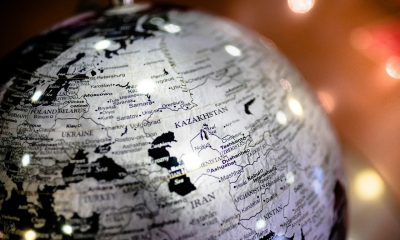Louchats firefighter tries to control a tactical fire. Wildfires are still raging in Gironde, southwestern France, July 17, 2022. REUTERS/Sarah Meyssonnier.
Nelaimės
Pietų Europa kovoja su miškų gaisrais, kai karščio banga plinta į šiaurę

A heatwave that swept across southern Europe and caused hundreds of deaths as well as massive wildfires, showed signs of abating Monday. However, it continued northward towards Britain, where authorities issued an extremist weather warning.
Many parts of Europe are experiencing heatwaves that scientists believe is consistent with climate change. The heatwave has caused temperatures to rise up to the mid-40s Celsius (over 110 Fahrenheit in some areas) and wildfires have erupted in dry, tinder-dry regions in Portugal, Spain, and France.
While temperatures in southern Europe started to cool over the weekend, thousands of firefighters battled to control wildfires. Authorities also warned that there was still a high risk of more fires
According to the Carlos III Health Institute, Spain was experiencing the eighth and final day of a heatwave that lasted more than a week. It caused more than 510 heat-related deaths.
Galicia, Castille, Leon, Catalonia and Extremadura were all engulfed in fires, and Spain was saddened by the loss of one firefighter from the province of Zamora in the northwest. Nearly the entire country is at risk from extreme fires.
El Pont de Vilomara, Catalonia: Evacuees gathered in front of a civic center. One among them was Onofre Munoz (69), who claimed that his van and home had been totally destroyed.
"We bought the van after I retired, and it's completely scorched. He said that they had nothing.
One window in our house exploded and an enormous flame came into the home. It was obvious that it had happened yesterday afternoon when we took photos and saw the extent of the damage.
According to official data, Spain has seen more than 70,000 hectares (173,000 acres of land) burn this year. This is the worst year in ten years. A massive wildfire in Sierra de la Culebra and Castille, Leon destroyed approximately 30,000 hectares.
Spain also reported another death from a wildfire, following the Sunday death of a fireman. Emergency authorities reported that a 69-year old man was killed in a wildfire in Ferreruela. Local media reported that it was a farmer.
According to the Portuguese Institute of Meteorology, (IPMA), although temperatures fell over the weekend in Portugal, wildfire risk remained high throughout most of the country.
Authorities said that more than 1,000 firefighters were fighting nine ongoing wildfires with the support of 285 vehicles and 14 planes. They are mainly located in the country's northern regions.
Germany and Belgium were among those countries that expected the heatwave to strike them in the coming days.
According to the EU, it is closely monitoring wildfires in southern member countries on Monday and sent a firefighting aircraft to Slovenia over weekend to add to recent deployments to France or Portugal.
Balazs Ujvari, spokesperson for the organization, stated that they will continue to monitor the situation during this unprecedented heatwave. He also promised to mobilize support as necessary.
He added that the EU also provided satellite imagery to France. Separately, in a report, the Commission stated that nearly half of the bloc's territory was at risk of drought.
Britain was set for its hottest Monday in history on Monday, with temperatures reaching 40 Celsius (Fahrenheit). This caused train companies to cancel their services and schools to close earlier. Ministers also urged the public to stay home.
The government has issued a "national emergency" alert because temperatures were expected to exceed the 38.7C (102F), recorded at the Cambridge University Botanic Garden in 2019.
"We had hoped that we wouldn't reach this situation, but for the first time ever, we are forecasting greater then 40C in the UK," Dr Nikos Christidis (climate attribution scientist at Met Office), said.
Climate change already has an impact on the UK's ability to experience extreme temperatures. He said that 40C days could be 10 times more likely under the current climate than in a natural climate without human intervention.
Local authorities in Gironde, southwestern France said Monday that the fires had decimated 14,800 hectares (377,000 acres) of land. The area has been evacuated by more than 14,000 people. France issued red alerts in several areas, which are the most severe, and residents were urged to be "extremely vigilant."
Forecasters in Italy are expecting temperatures to rise above 40C in many regions, including Italy, where small fires have been lit in recent days.
The heatwave also affected Switzerland. Operator of the Beznau nuclear power plant, Axpo, stated Monday that it had to cut its output in order not to overheat Aare, from which it draws its cooling waters.
The Swiss government issued a heat advisory, warning of severe danger in large parts of the country. Temperatures reached 36C (96.8F) in some areas.
Pasidalinkite šiuo straipsniu:
-

 Bangladešasprieš 5 dienas
Bangladešasprieš 5 dienasBangladešo užsienio reikalų ministras kartu su Bangladešo piliečiais ir užsienio draugais vadovauja Nepriklausomybės ir Nacionalinės dienos šventei Briuselyje
-

 Konfliktaiprieš 3 dienas
Konfliktaiprieš 3 dienasKazachstanas žengia: Armėnijos ir Azerbaidžano takoskyros tiltas
-

 Rumunijaprieš 5 dienas
Rumunijaprieš 5 dienasNuo Ceausescu našlaičių namų iki valstybinių pareigų – buvęs našlaitis dabar siekia tapti Pietų Rumunijos komunos meru.
-

 Kazachstanasprieš 4 dienas
Kazachstanasprieš 4 dienasVykdydami aplinkosaugos kampaniją, savanoriai atranda bronzos amžiaus petroglifus Kazachstane




















